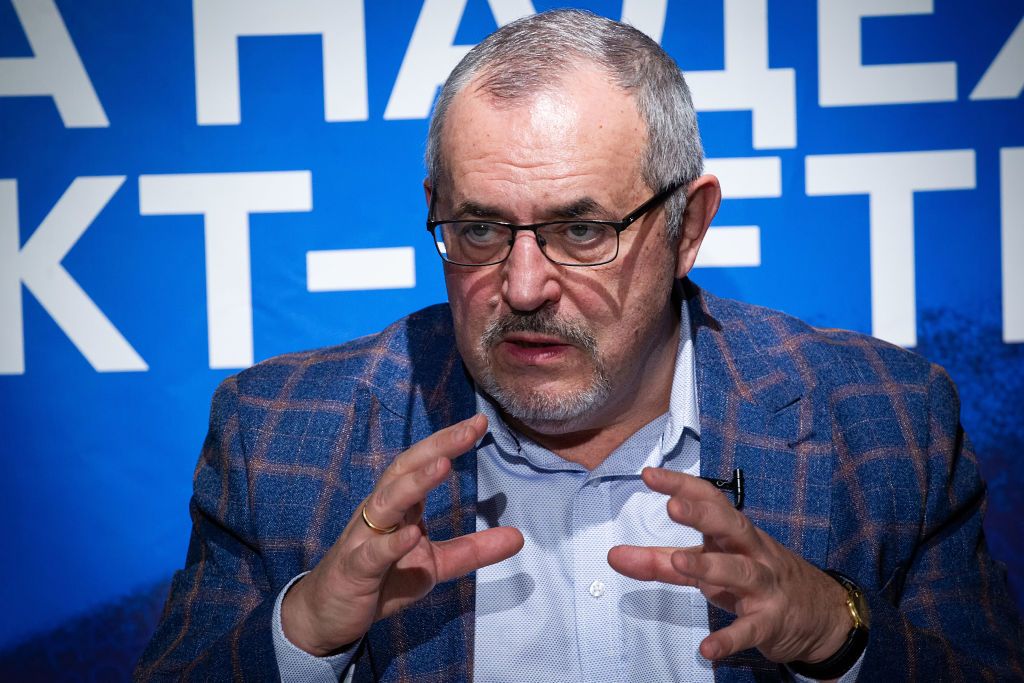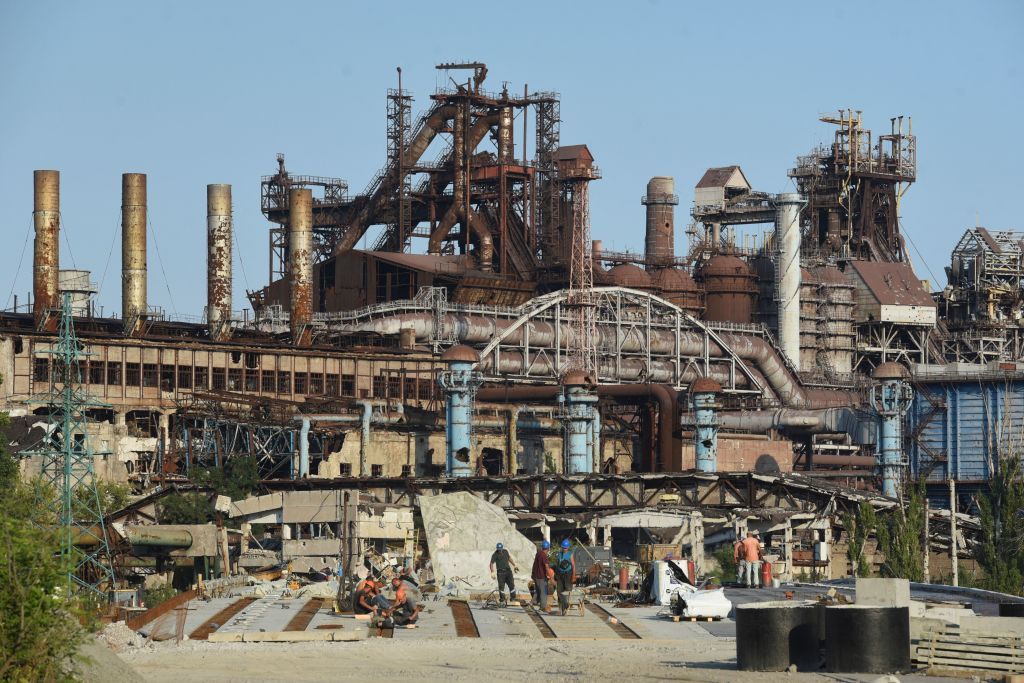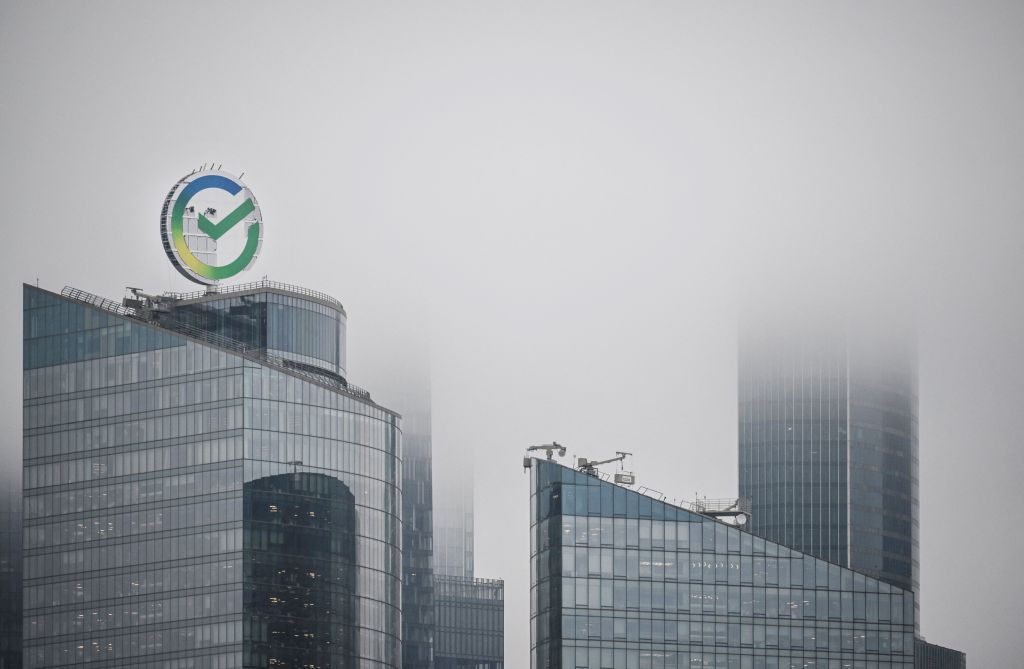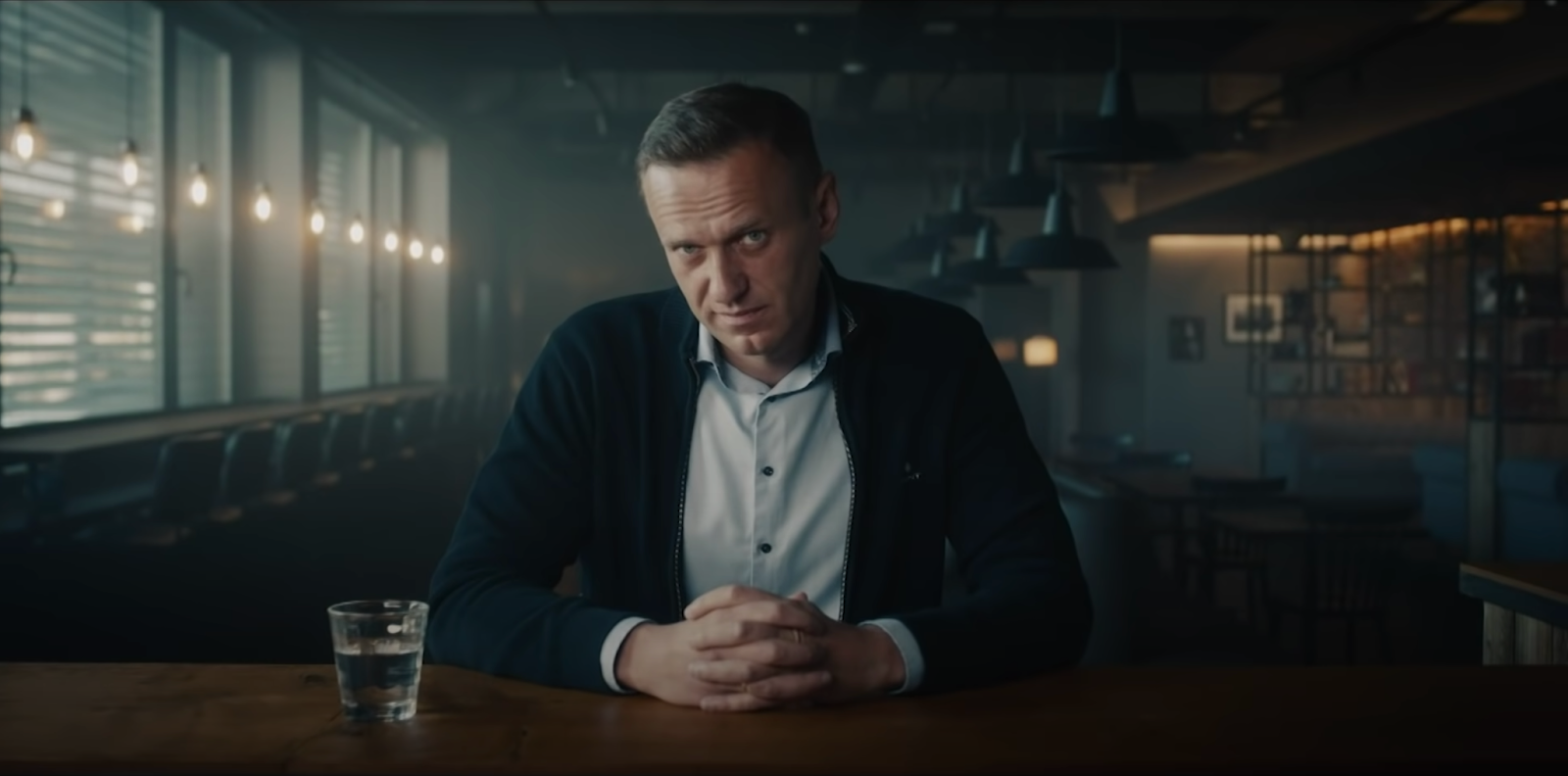Short-lived rise of Boris Nadezhdin, Putin's 'anti-war' opponent

Russian elections are usually predictable and dull affairs.
The outcome is known beforehand since the Kremlin handpicks all the candidates, has total control over the media and also rigs the votes.
Despite this, there has been an unexpected flurry of activity in the run-up to the March 15-17 presidential election in Russia.
In December, the Kremlin allowed Boris Nadezhdin, the only anti-war candidate, to take part in the first stage of the registration process for the upcoming election.
Nadezhdin, who constantly appeared on Russian propaganda channels and never was seen as a serious threat to the regime, consolidated the anti-war opposition behind him, changing his tune.
Huge lines formed to sign up for his candidacy in the election. That’s when his fate was sealed.
The Central Election Commission, which like all Russian institutions is closely linked to the Kremlin, refused to register Nadezhdin for the election on Feb. 8.
Experts say that the Kremlin was afraid of a scenario similar to the 2020 Belarusian election, when an unlikely opposition candidate, Sviatlana Tsikhanouskaya, got widespread popular support not because of her own position but because of a strong urge to vote against the country’s autocrat Alexander Lukashenko.
This triggered the largest protests in Belarus' history, which were brutally suppressed.
Analysts say that, if registered, Nadezhdin would be unlikely to get as much as Tsikhanouskaya. However, he would most likely be the runner-up and spoil the Kremlin's "election ritual” of showing nationwide support for Putin.
Nadezhdin did not respond to a request for comment.
Who is Nadezhdin?
Nadezhdin, 60, holds physics and law degrees.
He worked as a scientist at a physics research institute in the 1980s and as a lecturer in legal studies since 1999.
Nadezhdin was also a member of Moscow Oblast's Dolgoprudny city council in 1990-1997 and since 2019.
In 1999-2003, he was a member of the State Duma, the Russian parliament's lower house, from the liberal Union of Right Forces party.
Nadezhdin portrays himself as a liberal.
He was an aide to Boris Nemtsov, then a deputy prime minister, in 1997-1998. Nemtsov later became one of the main critics of Putin and was killed in front of the Kremlin in 2015.
Nazhezhdin also took part in Russia's 2011 protests against rigged parliamentary elections.
Despite his liberal views, Nadezhdin has never been a member of the radical opposition and has admitted being acquainted with top members of Russia's political establishment.
"Nadezhdin has been part of the moderate opposition," Russian political analyst Dmitry Oreshkin told the Kyiv Independent. "He has never quarreled with the authorities, although it doesn't mean that he is a supporter of the Kremlin."
In 1998, he was an aide to then Prime Minister Sergei Kiriyenko and has communicated with him regularly since then. Kiriyenko is currently Putin's deputy chief of staff in charge of domestic policy, including elections.
Kiriyenko, who was a member of the Union of Right Forces party and considered a “liberal,” is said to firmly control Russian civilian administrations in occupied Ukrainian regions. He’s also under Ukrainian, U.S. and EU sanctions.
Nadezhdin, himself, represented several Kremlin-friendly parties - the liberal Right Cause, Growth Party, and Civil Initiative, as well as the center-left Just Russia. The Civil Initiative nominated him as a presidential candidate in December.
In 2012, Nazhezhdin was an election observer for Putin and a representative of the pro-Kremlin politician Sergei Mironov, leader of the Just Russia party, who has called for genocide.
Nazhezhdin came under fire in 2015 for running in primaries organized by the ruling United Russia party. He claimed subsequently that his unsuccessful run in the primaries was a "trolling” attempt.
Additionally, Nazhezhdin has often taken part in pro-Kremlin political propaganda shows on Russian TV. He often voiced liberal views on these shows but was lambasted by the opposition for taking part in the Kremlin's propaganda by playing the role of a "whipping boy."

Analysts say that Nadezhdin was allowed to take part in the first stage of the registration process because of his moderate stance and links to pro-Kremlin politicians.
Another reason is that Nadezhdin lacks charisma and that is why the Kremlin thought he was unlikely to pose any risk, Sergei Sazonov, a Russian-born political philosopher at New York University, told the Kyiv Independent.
"Nadezhdin is not charismatic," he said. "Putin chooses such people on purpose. Putin wants such people to be the face of the opposition."
Oreshkin agreed, saying that Nadezhdin "doesn't have the masculine charisma that is valued highly by the electorate."
In this sense, Nadezhdin contrasts with the charismatic opposition leader Alexei Navalny, who would be likely to get more popular support if he ran, Oreshkin and Sazonov said.
"It would be better if Navalny ran," Oreshkin said. "That's why he's in jail."
Navalny has been banned from participating in elections and jailed on trumped-up charges. He is expected to be in prison until the late 2040s.
United opposition
Despite Nadezhdin's problems, he has managed to unite the anti-war opposition and get more popular support than expected.
"He has become the focus of social expectations," Oreshkin said.
By explicitly saying that he would end the war against Ukraine if elected, Nadezhdin has attracted many opponents of the Russian invasion.
As a result, despite the odds, he became the united opposition candidate.
Nadezhdin’s presidential candidacy has been endorsed by many opposition politicians, including Navalny's team, exiled tycoon Mikhail Khodorkovsky and liberal politician Maxim Katz.
The Nadezhdin campaign is the first unification of Russia’s opposition in years. In previous elections, the opposition had been usually split over strategy and the choice of candidates.
Before his campaign, the polls looked bleak for Nadezhdin. He would get a mere 1% of the vote, according to a Levada Center poll published in December.
But his rating soared as he launched his anti-war campaign in January.
According to a Russian field poll ordered by Nadezhdin and published on Jan. 31, 62% of all respondents would vote for Putin, and 8% would support Nadezhdin.
Nikolai Kharitonov from the Communist Party and Leonid Slutsky from LDPR, a nationalist party, would get 3% each, and Vladimir Davankov from the New People, a Kremlin-friendly center-right party, would get 1%.
Out of those who are planning to vote and have chosen their candidate, Putin is expected to receive 79.2%, while Nadezhdin, Kharitonov and Slutsky are expected to get 10.4%, 4.1%, and 2.9%, respectively. Davankov would trail behind with 1.1%.

However, Nadezhdin's rating is still below the total percentage of opponents of the war and Putin's regime.
According to a poll published by the Levada Center in January, 77% supported Russia's war against Ukraine, and 16% opposed it.
A total of 71% believed the country was moving in the right direction, and 18% thought it was moving in the wrong one, according to a different Levada Center poll published on Feb. 1.
Oreshkin said that some opponents of the war are not going to vote for Nadezhdin because they believe that taking part in Putin's rigged elections doesn't make sense or because they do not support him personally.
All polls in Russia are untrustworthy and should be treated critically.
Peace talks with a twist
Analysts say that the main boost for the Nadezhdin campaign came from his explicit anti-war stance.
He has promised to end the war against Ukraine and immediately start peace negotiations.
However, some of his views on the war are controversial.
Specifically, Nadezhdin has said that some of the occupied territories may be returned to Ukraine but not necessarily all of them. He argued that their status should be determined during peace talks.
He also said that some of the occupied territories may be deleted from Russia's Constitution if a peace deal is reached.
Nadezhdin argued, however, that residents of the occupied territories should be "asked" about whether they want them to be Russian and Ukrainian.
In 2018, Nadezhdin said that Crimea was "currently" Russian and added that it was unlikely to return to Ukraine within several generations.
During the presidential campaign, Nadezhdin reiterated that Crimea "is Russian, according to the Russian Constitution."
"An absolute majority of Crimeans want to live in Russia," he said. "You don't even need a referendum for that."
Additionally, Nadezhdin said during the campaign that Russian courts should try war crimes committed by Russian troops in Ukraine but international courts must not be allowed to do that.
He also said that Putin can't be tried for his crimes because of the Russian law that gives former presidents total immunity.
Registration mess
Nadezhdin said on Jan. 31 that he had collected 208,000 signatures from Russian citizens in Russia and abroad in more than 120 cities and towns.
Out of these, he submitted 105,000 signatures to the Central Election Commission on Jan. 31 because one of Russia's draconian election restrictions bans submitting a bigger number than required. This makes it easier for the commission to recognize some signatures as fake and ban candidates from running.
On Feb. 8, the commission refused to accept Nadezhdin’s signatures and register him as a presidential candidate.
The Central Election Commission claimed that 9,147 of the 60,000 signatures checked by its experts - more than 15% of the signatures - were invalid. For successful registration, no more than 5% of a candidate's signatures must be invalid.
Nadezhdin said he would file an appeal with the Supreme Court to dispute the commission’s decision.

Experts say that the Central Election Commission arbitrarily uses the signature collection process to ban candidates inconvenient for Putin and greenlight Kremlin-approved candidates.
Stanislav Andreychuk from Golos, an election watchdog, told Current Time on Feb. 7 that nobody knows the methodology that the Central Election Commission uses to assess signatures, and it is impossible to conduct an alternative expert assessment to dispute the results.
"This whole procedure in its current form doesn't have anything to do with identifying genuine support for candidates," he said. "It comes down to orthography and the arbitrary rejection of candidates."
In the past, the commission routinely banned candidates with confirmed popular support and, on the other hand, approved the signatures of candidates whose ratings were close to zero, according to opinion polls.
The Central Election Commission had also previously refused to accept signatures from people that went to the commission to say it was their own genuine signature.
Based on screenshots of signatures published by the Nadezhdin campaign, Russian election expert Roman Udot concluded on Feb. 6 that the Central Election Commission had recognized some valid signatures as "invalid" just because the commission's computers made errors when transforming them into the digital format.
For example, one signature was recognized as invalid because the commission had transformed the signature of a resident of "Rostov on Don" to "Rostov on Dom" (Rostov-on-the-House) by mistake. Agentsvo, an investigative journalism project, called the resident and verified that it was a genuine signature.
Nadezhdin told Agentsvo on Feb. 6 that the Central Election Commission had admitted making such mistakes regarding dozens of signatures.
A dangerous candidate
The upsurge in Nadezhdin's popularity is the main reason why he was not registered as a presidential candidate, analysts say.
Before Nadezhdin attracted popular support, his candidacy did not pose any risk.
"This was the main characteristic of the election ritual," Oreshkin said. "There was a great undisputed leader, and there were small fry around him."
But as Nadezhdin's campaign kicked in, the situation changed.

"A real possibility of breaking the (Kremlin's) paradigm emerged," Oreshkin said. "In that case, there would be two alternatives - Putin with his pro-war position and Nadezhdin, who is associated with humanism and rationalism. The government couldn't let that happen. That's why they did not register him."
Sazonov said that the Kremlin was likely afraid of the "Tsikhanouskaya scenario."
However, Sazonov and Oreshkin said that the Belarusian scenario would be unlikely in Russia because Putin still has much more popular support than Lukashenko did.
"Most people sincerely believe that Putin is defending the motherland," Oreshkin said. "Putin is supported by a majority in Russia."
Oreshkin said that Putin would likely still get around 60% in honest elections without vote rigging with the current lineup of candidates, including Nadezhdin.
Sazonov attributed the Kremlin's decision not to register Nadezhdin to paranoia.
"They're afraid of any alternative," he said. "In fact, Nadezhdin doesn't pose any threat for them."
However, Oreshkin and Sazonov admitted that Putin's popularity was mostly due to the Kremlin's absolute control of the media.
If Russia had the freedom of speech and if Putin ran against Navalny, he could lose a presidential election, Sazonov said.
Note from the author:
Hello! My name is Oleg Sukhov, the guy who wrote this piece for you.
I was born in Russia and moved to Ukraine in 2014 because I couldn't stand the suffocating atmosphere of that totalitarian country. I used to think it might be possible to transform Russia into a liberal Western-oriented country. Now it's clear that it's a lost cause.
But at least I can atone for the crimes of my homeland by exposing its barbaric aggression against Ukraine and providing objective and independent coverage of what is going on there. I'm also trying to contribute to Ukraine's transformation into a full-fledged Western liberal democracy strong enough to defeat Russia.
Our publication needs help from every one of you — support Ukrainian wartime journalism, become a member of the Kyiv Independent.















